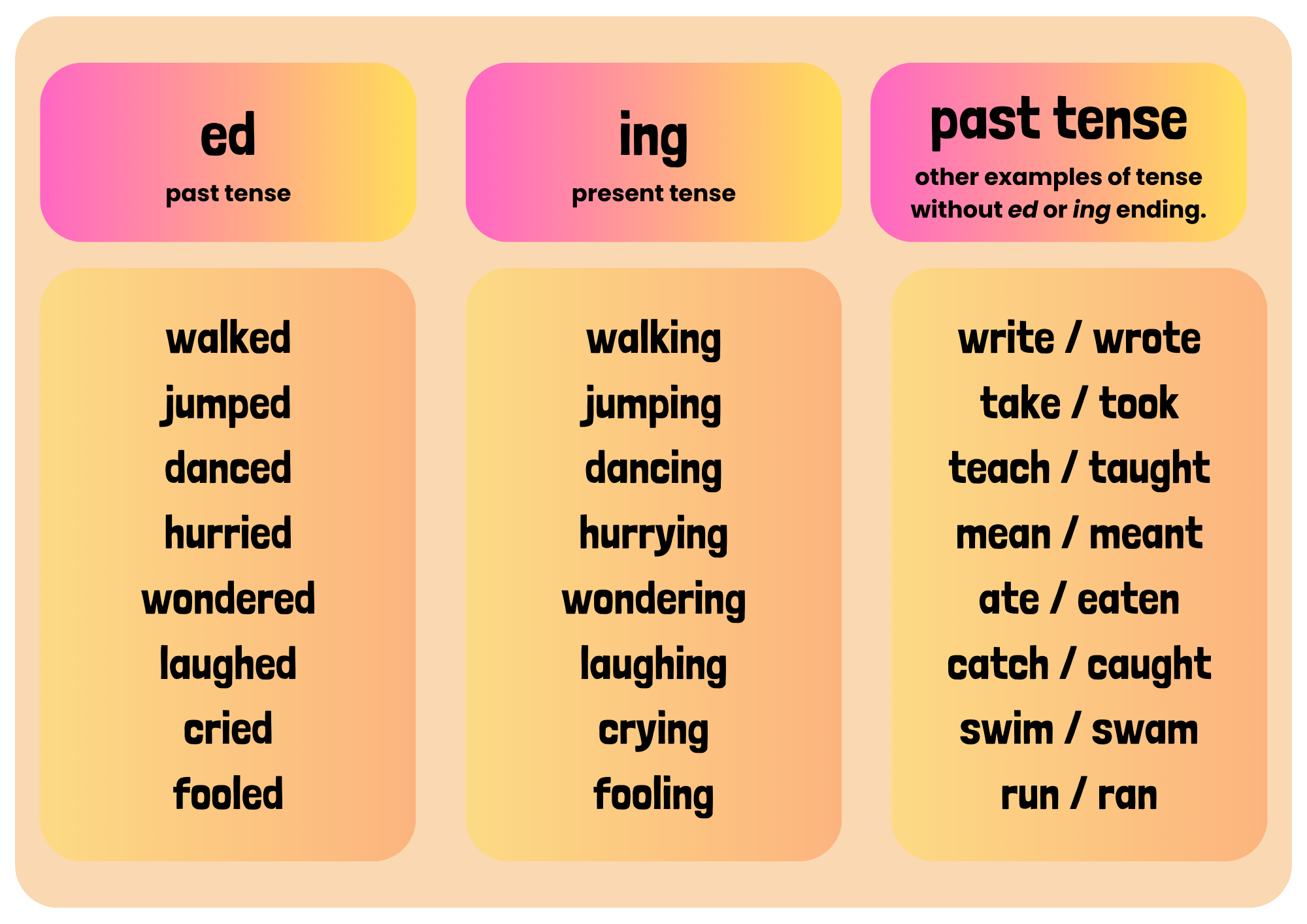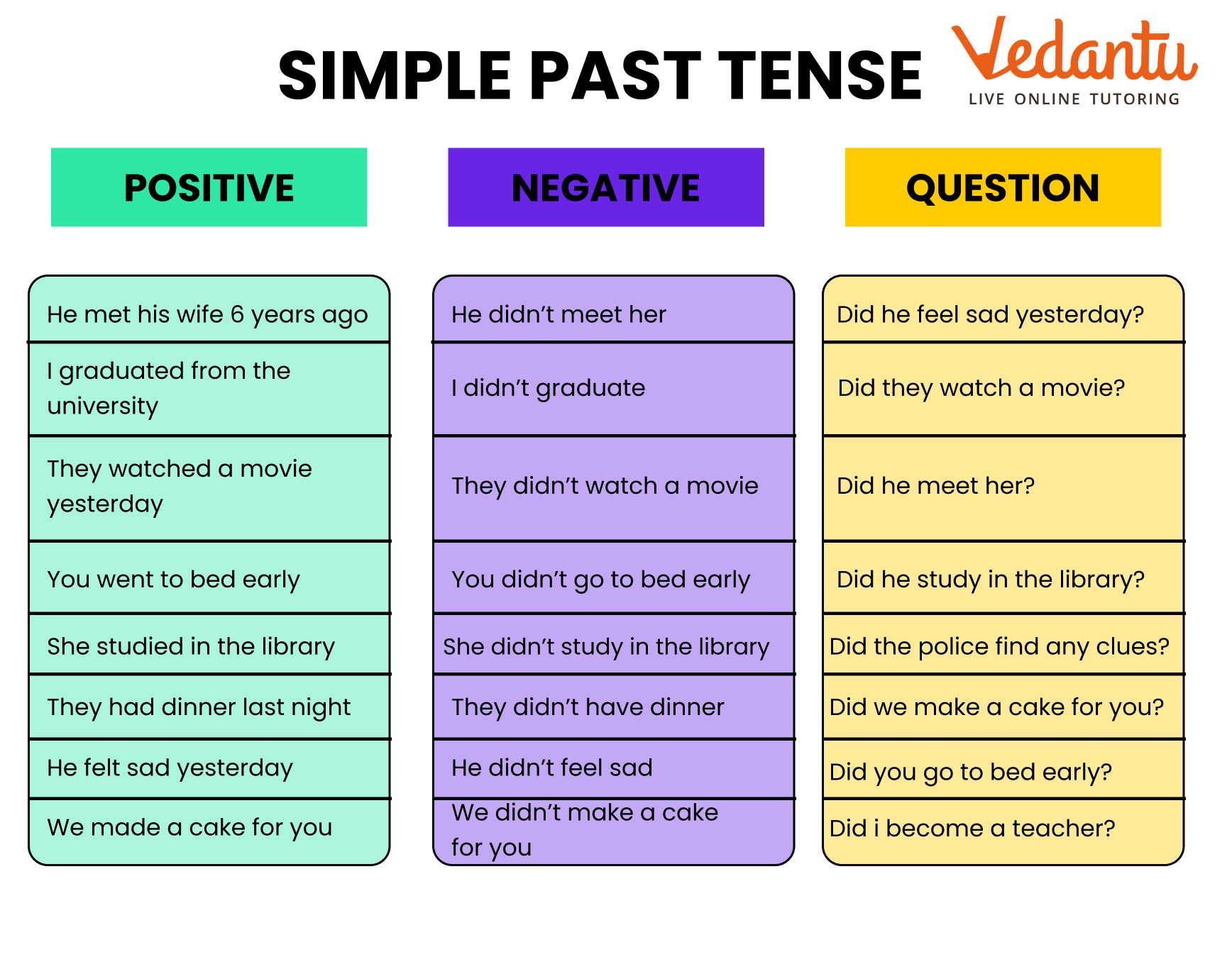




What are 10 examples of simple past tense sentences?
Mastering tenses is crucial for clear English communication. The primary focus of this page is on Simple Past Tense Examples, which help learners understand how to describe actions completed in the past. Explore definitions, rules, common mistakes, and plenty of practical examples to build a strong foundation in this fundamental grammar topic.
Simple Past Tense Examples: Definition and Structure
The simple past tense describes actions or events that happened and were completed at a specific time in the past. These actions do not continue into the present. Common time words include yesterday, ago, last (night/week/year), and when I was.... Understanding the simple past tense structure is essential for speaking and writing correctly.
The formula for the simple past tense is:
Affirmative: Subject + verb (past form) + object
Example: She went to the market.Negative: Subject + did not + base verb + object
Example: They did not play cricket yesterday.Interrogative: Did + subject + base verb + object?
Example: Did you see the film last week?
Explore English Grammar Topics
Simple Past Tense Examples Chart and Table
| Type | Structure | Example Sentence |
|---|---|---|
| Affirmative | Subject + verb (past) | I visited my friend. |
| Negative | Subject + did not + base verb | The boys did not finish lunch. |
| Interrogative | Did + subject + base verb | Did she call you? |
| Negative-Interrogative | Did not + subject + base verb | Didn’t you attend class? |
Refer to this chart for quick reference when making affirmative, negative, and interrogative sentences. Practising these formats regularly enhances fluency. For basic grammar tips, check out Basic English Grammar on Vedantu.
Simple Past Tense Rules and Usage Notes
The rules for the simple past tense depend on whether verbs are regular or irregular. Regular verbs add -ed to the base form, while irregular verbs have unique past forms. Use the simple past when time is definite. Words like ago (two days ago) and last (last year) signal its use.
Avoid mixing the past simple with the present tense in one sentence. For example, "I ate breakfast and go to school" is incorrect. Instead, use "I ate breakfast and went to school." This helps prevent common mistakes. Find more exercises on Grammar Exercises.
Simple Past Tense Examples with Sentences
Simple Past Tense Examples with sentences illustrate real-life usage. Here are 10 examples of simple past tense from everyday contexts:
She called her mother yesterday.
We watched a movie last night.
They traveled to Delhi two weeks ago.
He met his friend at the station.
You did not finish your homework.
My father cooked dinner.
The teacher explained the topic.
I lost my keys yesterday.
Did she read the book?
We didn’t go outside because it rained.
Want more? Try Simple Past Tense Examples and see 100 sentences of simple past tense for all levels. For young learners, English for Kids offers fun practice.
Simple Past Tense Worksheet with Answers
Practice is essential for mastering tenses. Here’s a simple worksheet you can try. Fill in the blanks with the correct simple past tense form:
He ______ (arrive) at 8 o'clock.
We ______ (see) the Taj Mahal last year.
They ______ (not/finish) their homework.
Did you ______ (meet) your teacher yesterday?
I ______ (make) a cake last week.
Answers: 1. arrived, 2. saw, 3. did not finish, 4. meet, 5. made. Find more worksheets with answers at Worksheets for Kids and challenge yourself with advanced past tense exercises.
Simple Past Tense Examples MCQ with Answers
Test your knowledge with these multiple-choice questions (MCQ) based on simple past tense rules and usage:
She _____ to the library yesterday.
(a) go (b) went (c) going
Answer: (b) wentDid they _____ the project?
(a) finish (b) finished (c) finishing
Answer: (a) finishWe _____ not see her at the party.
(a) did (b) do (c) did not
Answer: (c) did not
Practise MCQs and improve your grammar skills further using Class 3 English Grammar Practice.
Simple Past Tense Examples for Kids and Beginners
For children and beginners, simple past tense activities use relatable actions. Sentences are easy to read and remember, making English learning enjoyable for kids:
I jumped high.
She played in the park.
We danced at the party.
They watched cartoons after school.
He ate ice-cream.
Access creative activities and grammar games for kids at Learning Activities for Kids.
Common Mistakes and Tips in Simple Past Tense Usage
Common mistakes include using the wrong verb form or forgetting “did” in questions and negatives. Always follow these simple past tense rules:
Don’t use “do/does” with past tense; use “did”.
Never mix present tense verbs in the same sentence.
Watch out for irregular verbs (e.g., go—went, eat—ate).
Confused between past continuous and simple past? Check Past Continuous Tense Examples for a clear comparison. For more tips, browse Error Correction Exercises.
Difference Between Simple Past Tense and Other Past Tenses
Simple past tense indicates completed actions at a specific past time. The past continuous tense expresses ongoing actions in the past. For example, “I watched TV” (simple past) vs. “I was watching TV” (past continuous). Explore Past Perfect Tense and other tenses to improve your understanding.
See the types of past tense for clear usage notes and more examples.
Simple Past Tense Practice Questions with Answers
Try these practice questions based on simple past tense. Answers are given below each question for self-assessment:
Where ______ (be) you yesterday? Answer: were
Riya ______ (write) a letter to her aunt. Answer: wrote
Did Arjun ______ (finish) the exam on time? Answer: finish
I ______ (not/see) the message. Answer: did not see
Who ______ (tell) you about the festival? Answer: told
Keep practising with Correct the Sentences Exercises with Answers to master all verb tenses.
Most Common Irregular Verbs in Simple Past Tense
Irregular verbs do not follow the standard “-ed” ending. Here are some frequently used ones: go—went, do—did, see—saw, come—came, eat—ate. Memorise their past forms or refer to detailed lists for quick revision on the Irregular Verbs page.
Sample Simple Past Tense Examples from Real Life
Simple past tense is useful in many scenarios. For example, while sharing your experience, you can say: "I visited my grandmother," "They enjoyed the picnic," or "We celebrated my birthday last year." For writing about real events, see Few Lines on Birthday Celebrations or How I Spent My Summer Vacation Essay.
The simple past tense is a core part of English grammar, helping convey completed actions and stories from the past. With practice exercises, diverse examples, and helpful rules, you can confidently use simple past tense in conversations and writing. Vedantu offers a variety of resources and worksheets for further mastery of tenses and their applications.
FAQs on Simple Past Tense Examples and Easy Grammar Guide
1. What is simple past tense?
Simple past tense describes actions or events that were completed in the past. It is commonly used to tell stories, talk about finished tasks, or describe past experiences.
Key points to remember:
- Shows a completed action or state in the past
- Uses the past form of the verb (e.g. walked, wrote, went)
- Often used with time words like yesterday, last year, ago
2. What are 10 examples of simple past tense?
10 examples of simple past tense sentences help you see how the tense is used:
- I visited Jaipur yesterday.
- She played chess.
- He bought a car.
- We finished our homework.
- You called me last night.
- They enjoyed the movie.
- It rained heavily.
- He lost his wallet.
- She cooked dinner.
- I watched TV.
3. What is the formula of simple past tense?
The formula of simple past tense depends on the sentence type:
- Affirmative: Subject + past form of verb (+ object)
- Negative: Subject + did not + base form of verb (+ object)
- Interrogative: Did + subject + base form of verb (+ object)?
4. What are the four types of simple past tense sentences?
The four types of simple past tense sentences are:
- Affirmative: He walked to school.
- Negative: He did not walk to school.
- Interrogative: Did he walk to school?
- Negative-Interrogative: Did he not walk to school?
5. How do you form negative sentences in simple past tense?
Negative sentences in the simple past tense use 'did not' plus the base form of the verb.
- Structure: Subject + did not (didn't) + base verb
- Example: She did not eat breakfast.
- Tip: Do not use the past form after 'did not'.
6. When do we use simple past tense?
The simple past tense is used to describe actions or events that started and finished at a specific time in the past.
- Past events or actions (e.g., I played cricket yesterday.)
- Completed activities, routines, or habits in the past
- Stories and historical facts
- Actions with time words like ago, last night, yesterday
7. What are regular and irregular verbs in simple past tense?
Regular verbs form their past tense by adding -ed (e.g., played, cooked). Irregular verbs have unique past forms that do not follow a fixed pattern (e.g., ate, went, saw).
- Regular: clean → cleaned
- Irregular: go → went
8. What are 20 simple past tense example sentences?
Here are 20 sentences using simple past tense:
- Riya completed her project.
- We met at the market.
- He drove fast.
- I opened the door.
- She helped her friend.
- Rahul found his book.
- They celebrated the festival.
- You missed the train.
- I started my job.
- The teacher explained the lesson.
- The dog barked at night.
- I typed my notes.
- She smiled at me.
- We sang a song.
- He told a joke.
- I closed the window.
- You wore a new dress.
- The boy kicked the ball.
- They built a sandcastle.
- She washed her hands.
9. What are common mistakes in forming simple past tense?
Common mistakes when using simple past tense include:
- Using 'did' with the past form of the verb (Incorrect: Did you went? Correct: Did you go?)
- Missing 'did not' in negatives (Incorrect: He not play. Correct: He did not play.)
- Using incorrect time words (using 'since' or 'for' with simple past instead of present perfect)
- Confusing regular and irregular verb forms
10. Can simple past tense be used with time expressions like 'since' or 'for'?
No, simple past tense is not used with 'since' or 'for'. These time expressions require present perfect or present perfect continuous tense.
- Simple past: I lived here in 2015.
- Present perfect: I have lived here since 2015.
11. What’s the difference between simple past tense and present perfect tense?
Simple past tense shows a finished action at a specific time in the past, while present perfect connects past actions to the present.
- Simple past: I saw the movie yesterday.
- Present perfect: I have seen the movie.
- Simple past uses past time words; present perfect doesn't use exact past times.
























